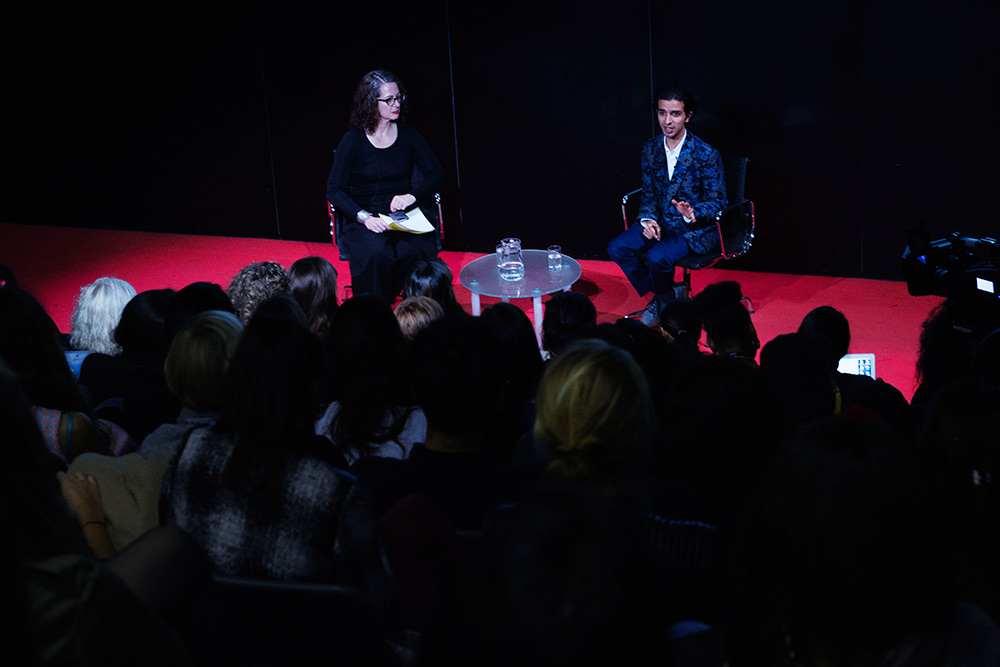- Inside the Industry with Imran Amed at LCF
- Inside the Industry with Imran Amed at LCF
- Inside the Industry with Imran Amed at LCF
Discussing all things creative and commercial, Business of Fashion website founder and editor Imran Amed set LCF’s 2014 Inside the Industry series off with an insightful and savvy start this week.
Since its inception in 2007 as a blog updated from Amed’s sofa, the Business of Fashion (BoF) has become an indispensible daily resource for fashion designers, executives, entrepreneurs and of course switched-on students worldwide.
As a self-proclaimed “fashion outsider” who had spent most of his career in the corporate world of management consultancy, Amed explained he wanted to see beyond the glamour, celebrity and flash bulb realm of fashion:
“That is obviously part of the industry but behind all of that is this magic. I was trying to understand how that magic happened and to show the more serious side of fashion.”
It’s this objective approach that has encouraged critics to not only take BoF seriously as a legitimate source but also the entire fashion industry as a global influencer –
“What BoF has done is provide a new dialogue around what the fashion industry is: how it can be improved, what its merits and demerits are, why it’s interesting and why it’s a contributor to popular culture.”
For an industry often considered trivial and superficial, it was motivating to hear someone with a healthy distance still value the driving force fashion is in society, from the economy to technology. Amed touched upon the excitement over the Apple watch at last month’s fashion shows, for example.
But for all its influence, he spoke as frankly in person about the industry’s failings as BoF. Amed answered students’ questions covering topics from intellectual property (“if creativity is the lifeblood of the industry then as an industry we must strive to protect ideas”) to underpaid internships (“I hope over time there’ll be more balance over how the profits of the fashion industry are shared”) to sweatshop labour (“just think about what it takes for a company to be able to sell a bag for £5, who has been rewarded along the way?”)
Hearing his points from a business as well as cultural perspective was particularly interesting. For budding fashion entrepreneurs, perceptive advice about appealing to consumers and “pro-sumers” (professional consumers taking an active role through social media and brand awareness) in the 21st century was gold dust.
“There’s still aspiration in fashion image but there’s a lot of inspiration in brands that are growing and developing online now. Inspiring people to be interested in your brand, to take part in your brand and to have a conversation about your brand is a much more powerful way of engaging people.”
Amed also took a considered approach to the current, unsustainable speed of design turnover. Reminding us “newness is what drives conversation but predictability, stability, experience, foundation is what drives the business of fashion”. In other words, designers don’t be overwhelmed! Find your own signature Chanel 2.55 bag, Burberry trench or Furstenberg wrap dress!
With BoF’s worldwide outreach, it was interesting to hear Amed’s view of the industry on a global scale. While he believes the four major fashion capitals will remain key, we should “do away with fashion nationalism”. He encouraged us to think of the global fashion centres as “global fashion platforms” rather than rigid representatives of that country’s own fashion tradition.
It’s a good point considering so many buyers and editors were apparently underwhelmed with last season’s collections. “If we looked for creativity beyond our own borders maybe we could make things a bit more exciting and make it justifiable to spend all that money and time travelling round.” Amed’s emerging market to watch out for is Africa and advice to expanding businesses is to always remain respectful of local cultures and traditions.
Of course the ultimate question was: what advice could he give anyone wanting to enter and be successful within fashion? A novice less than a decade ago, Amed has learnt everything he knows along the way and finished with a few simple guidelines. Keep your integrity and professionalism as a business and individual, designers wanting to make a success of their brands should understand the business basics too, find your USP and most of all remain passionate. “You have to care about this industry to be successful in it.”
From someone who’s built an award-winning resource up from mere “passion project”, there are few who’d know better.
Thank you @FCorner and @LCFLondon for hosting us this evening! #insidefashion pic.twitter.com/mKr5up1dap
— Business of Fashion (@BoF) October 14, 2014
- Words by Fi Anderson, BA (Hons) Fashion Journalism 2015
- Photography by Andrea Milla Perez
- Read more on Frances Corner’s blog
- Read more about Inside the Industry at LCF




